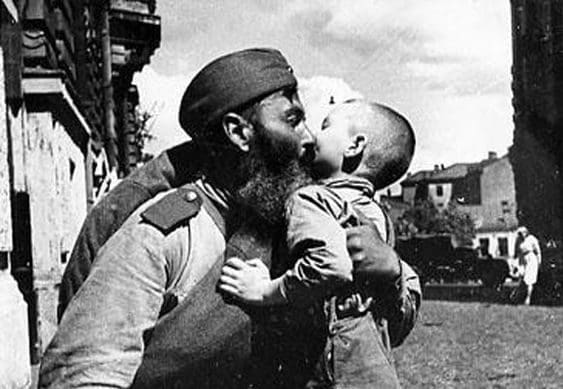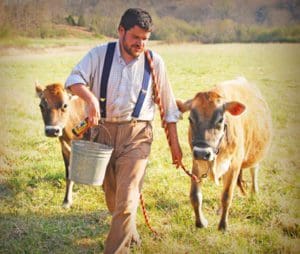[…] post The Hero Always Comes Home appeared first on The Catholic […]
A blog for Catholic men that seeks to encourage virtue, the pursuit of holiness and the art of true masculinity.
The Hero Always Comes Home

We should be reluctant to divide things that are not divided. Or, if we are to divide things, we do so in a way that allows for them to be reunited so as to be more fruitful. God, for example, “divides” Eve from the side of Adam, but then brings them together into beautiful fruitfulness. This is the pattern of creation itself – God “divides” the light and dark, land and sea, and so on so as to bring them all together into the beauty and order of creation.
Those that study the great hero stories from around the world recognize that the dividing and reuniting of men from their loves is the driving narrative behind the legends. Odysseus, for example, goes forth to battle, but he goes forth from his home, and the whole point of his journeys and trials after the war is to return home. The direction from the hero takes a temporary leave from the home, but he leaves it for the sake of it, for what is behind, and then does all he does to fight his way back there.
Joseph Campbell in his famous work Hero With a Thousand Faces summarizes this heroic journey into three parts – departure, initiation, and return. A man departs from home, endures the trial, and then comes back. We can look at the Hero, Jesus Christ, and recognize that it is not just that He leaves heaven to come to earth, but that He endures the cross for the sake of His “home”, and then returns to that home. That “home” of heaven is very familial in nature – the Bible refers to it as a wedding feast and salvation itself as an “inheritance” from the Father.
Heroes Wanted
Today there are two very problematic tendencies among men that show we will never be the heroes that are memorialized in our legends. First, we are scared of

marriage in the first place. We depart from boyhood, often with a spirit of “floating” or “going with the flow”, but without the true endurance of a challenge. But worse is that fact that we depart from boyhood, but never “return” to the home in marriage.
The second tendency is to idealize work and our identities associated with careers to the neglect of the family. Now, men have to work. Work is good. God made work. But the endurance that it entails is always for the family. If you get more happiness and satisfaction from work than you do from home, then your heart has failed to “return” after each day, and you could be described as leaving work to endure the family so as to return to work the next day – a reversal of the hero’s journey. The end being pursued in this case is not family, but the self. It does not matter if it earns a lifestyle for your family that they get to enjoy, if your heart is divided from them without a full return, then you are not a hero.
Returning Home
The theologian Josef Pieper warned us of the world of “total work”, which he outlines in Leisure: The Basis of Culture. Clearly today we live in that world. We think, identify, and measure ourselves based on work, productivity, and career, not the health and wellbeing of household, which was the traditional measure of a man’s success. Education is not an act good in itself, but pursued only to earn more money. Pieper takes up the Aristotelian idea that we work so as to have leisure, but today we only rest so as to take up our work again. A great way to fight this is to learn to rest and revel in the life of our family, not just use the home as a place to rest in between workdays.
Yes, it is more complicated since we are no longer agrarians and a globalized and industrialized economy simply does divide us more from home. But we can, despite having to leave each day, redouble our efforts to set our hearts on what we leave behind, so that when we return we give the best and deepest parts of our hearts to our wives and children. G.K. Chesterton said that the good soldier does not hate what is before him, but loves what is behind him.
The good news here is that we were made to be fathers. Our happiness will be lasting and blessed if our hearts are oriented toward the love of family. In a society where frantic yet unhappy activity seems to plague every moment, and where the very truths of nature and faith are attacked daily, the Catholic man in this exile will shine as truly happy, because he loves his family. This is why our weapons are not primarily in words or even deeds, but in the abundance and acceptance of life and home.
Fatherhood itself is the Lord’s gift, the fruitful womb is a reward that comes from him.
Crown of thy youth, children are like arrows in a warrior’s hand.
Happy, whose quiver is well filled with these; their cause will not be set aside when they plead against their enemies at the gate. – Psalm 127:3-5
—
Jason Craig works and writes from a small farm in rural North Carolina with his wife Katie and their five kids. Jason is the Executive Director of Fraternus, a mentoring program for young men, and holds a masters degree from the Augustine Institute. He is known to staunchly defend his family’s claim to have invented bourbon.
Don’t Miss a Thing
Subscribe to get email notifications of new posts and special offers PLUS a St. Joseph digital poster.
Related
COMMENTS
Reader Interactions
Comments
Trackbacks
-
-
[…] Classic and enduring stories and histories of heroic journeys, including that of Our Lord, can generally be divided into three parts – the departure, the initiation (the trial or challenge), and the return home. There has been no time in human history more desperate for heroic Catholic men than ours. How can such stories inspire and edify modern men awash in modern culture? Jason Craig on The Catholic Gentleman does an excellent job of showing just this in his article, The Hero Always Comes Home. […]
Jason Craig. I always enjoy reading your posts. Please keep up the great work. May God bless you and your family.
Great article! God bless you.
I’m grateful to have found this:
“The second tendency is to idealize work and our identities associated with careers to the neglect of the family…If you get more happiness and satisfaction from work than you do from home, then your heart has failed to “return” after each day – a reversal of the hero’s journey.”
This is such an important message for those of us with a tendency towards work-a-holism, to hear!
Thanks for posting this Jason and Sam!
Chad
Great article. Thanks! Your work doesn’t define your identity, but it is an expression of your identity. However, some things in life – such as your relationship with God and your family – are intrinsic to who you are. That’s where home is. God bless!
Enjoy your writing. Very similar to J. cuddeback’s ideas in Bacon from Acorns